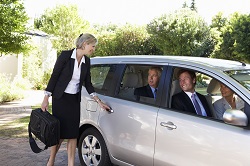Commuting becomes faster, cheaper, cleaner and more social
The sharing economy is taking on yet another sector as more and more people choose to carpool. While 70 % of Europe’s commuters drive to work, almost always in the vehicle by themselves, carpooling has started to move from long-distance trips to short-haul trips. A pioneer in this respect has been Karos, which launched a smart mobility platform in Paris that enables shared rides to the workplace based on artificial intelligence (AI), mobile technologies and big data. Founded in 2014, the company has successfully built partnerships with large companies that subsidise the service to the benefit of their employees. Technology makes carpooling smart ‘Karos transforms empty car seats into public transportation networks and connects them with mass transit,’ says the company’s cofounder and president, Olivier Binet. ‘We improve the daily commutes of users who save time and money, and they get to meet new people.’ The unique intermodal carpooling platform achieves this by learning users’ daily mobility habits, predicting their next trips, and connecting them automatically to all other users who match their itinerary and their commuting time. ‘The Karos app enables our users to carpool in a very seamless and flexible manner with different people at different times,’ explains Binet. ‘They aren’t stuck with the same person every day at the same time.’ The app, which was launched in 2016, has attracted as many as 80 000 users already. The number of carpool trips with Karos has grown by 9 % over the last 15 months, with a very high satisfaction rating from users based on Android and Apple app download feedback. ‘On average, our users save 24 minutes per trip compared to traditional public transport and save EUR 82 per month compared to driving alone.’ The app’s success is based on powerful geolocation and AI technologies, without relying on battery-draining GPS technology. It predicts users’ trips over the next five days and matches them automatically with others. ‘In addition to recommending optimal routes that minimise detours, the app proposes the best door-to-door itinerary combining carpool and mass transit,’ reveals Binet. A cleaner urban transport mode for Europe The future also looks bright for the app as Karos expands to Bordeaux, France’s sixth largest city. ‘We are also working with a large number of French and European urban areas to launch the service in 2018,’ says Binet. From an ecological perspective, the Karos carpooling solution has already reduced CO2 emissions by 102 tonnes and NO2 emissions by 248 kg. ‘Increasing the load factor of cars is a great way to keep making all these trips, resulting in fewer cars on the road and fewer emissions,’ explains Binet. ‘The potential for CO2 and NO2 emissions reduction is very significant.’ If more cities in Europe and indeed around the world start adopting the technology, citizens will begin enjoying the benefits of less congested roads, faster road trips and less pollution in cities.
Keywords
Karos, carpool, commuters, mobility, AI, public transport, mass transit, intermodal, geolocation



